- Home
- Jennifer A. Nielsen
Resistance Page 17
Resistance Read online
Page 17
To cover my silence, she said, “Well, if I outlast the war, then—”
“Shh.” I grabbed Esther’s arm and pulled her close, certain that I heard a noise off in the woods, to our right.
“What is—” Then she heard it too. The crunch of snow and the fallen leaves beneath it. The crack of a branch against a body in motion.
It was the very same sound as we had heard last night. Except this time, we didn’t have the barn to hide in. We didn’t have anywhere to hide.
And we were definitely not alone.
“Keep walking,” I whispered. “Don’t look around. Just walk, like we have every right to be here.”
“Should we get out your gun?” she asked.
“I won’t brandish a weapon that I can’t use.” But the kitchen knife was in my coat pocket and I wrapped my hand tightly around it. I didn’t know why. The only way this knife would help me was if I had to fight someone up close, and whoever was in the woods could shoot us before I’d even seen their face. Nor was it just one person. Now that I was attuned to it, I felt the weight of many eyes on us. It was still too dark to see them where they hid in the undergrowth. However, Esther and I were out in the open and plenty visible. Plenty exposed.
“It might be deer,” she offered.
It wasn’t deer. The hairs on the back of my neck were raised, an instinctive warning of an approaching threat.
If it was German soldiers, then they’d been tracking us since our escape last night. What were they waiting for?
Esther pressed at the back of my arm, pushing me to walk faster, but I couldn’t do that. We couldn’t let on that we knew we were being watched. That might prompt a confrontation sooner than I wanted it. I needed time to plan. To think of something—anything—to do.
The sounds were moving closer. From the corner of my eye, a glint of metal reflected in the moonlight. A rifle barrel was aimed directly at us.
“Stop where you are,” a man’s voice ordered. “Drop your bags or we’ll shoot.”
We obeyed, though my legs were shaking so much that I didn’t trust them to keep walking. I clasped Esther’s good hand in mine and was surprised at how hard she gripped my fingers. The rest of her body had gone rigid and her eyes were closed, but I intended to look. I wanted to see the face of the man who shouted that order. If he was going to shoot, I wanted him to remember me.
February 20, 1943
Bolimowski Park
Seconds passed and no one emerged from the woods. Esther and I both remained exactly where we were, though I hated feeling that the delay was only giving the people in the woods more time to position themselves for what would be an entirely one-sided fight.
Finally, I’d had enough. “Show yourselves, cowards!” I shouted.
Esther opened her eyes long enough to send me a scalding glare, but I ignored it. Whatever was about to happen wouldn’t change whether I insulted them or fell on my knees to beg for mercy. And I had no plans to do that.
“Wait, I know her!” a voice called from the woods. “Don’t shoot—that’s Chaya Lindner.”
Esther and I exchanged another look, a different one this time. No one should know me up here. No one should really know me anywhere.
But when a familiar face emerged from the woods, I let out a shriek of joy and surprise. “Rubin?”
I hadn’t seen him since the night of the Cyganeria attack two months ago. Had he really survived?
He pulled me into a hug, then, as we parted, his eyes settled on Esther. Somehow, he must not have recognized her before this. His mouth hung half-open when he looked back at me. I’m sure this was the last person he would have expected to see within a kilometer of me.
“You’re alive too?” he asked Esther. “I had no idea—either of you.”
Questions rushed through my mind, but then three other people emerged from the woods, two men and a woman. One man wore a Polish military uniform, but the other two were in thick winter overalls, belted at the waist, and with rifles slung over each shoulder.
“Who are they?” Esther whispered.
“It’s all right.” Rubin gestured back to them. “They’re friends.”
The woman reached out, taking my hands in hers and pulling me closer. “And we’re friends to you. My name is Mindla. You helped get me out of the Krakow Ghetto. You saved my life.”
I remembered her now. We’d smuggled her out in a wagon built with a false floor that could fit two or three people between the two layers of wood. She was not as thin as before and had a fire in her eyes that I never saw back in the ghetto.
Slowly, at least a dozen more men and women joined us on the road. One or two were about my age, and some were much older, perhaps in their forties. A couple of others were in military uniform, but everyone was armed.
Rubin widened his arms with a goofy smile. “We always said we’d join the partisans one day. Well, you made it here too!”
I was so relieved to be in friendly company, to see Rubin, I hardly knew how to respond. I only smiled back at him and gladly let him take my bag and then Esther’s to carry.
“Let’s get off the road,” one man said, then turned to me. “We have some hot coffee back at camp, and a warm place you can rest.”
“Is it safe?” Esther whispered.
“Safer than out here,” Rubin assured us.
As we followed the others back into the woods, Rubin stayed close by my side. “Where were you going?”
“Warsaw.”
He touched my arm. “No, Chaya. You must know what is happening there.”
I stared back at his widened eyes and his mouth pressed into a tight frown. Maybe the conditions in Warsaw were worse than I’d heard.
“I know the Germans tried to carry out a deportation a month ago, but the resistance fought them off,” I said. “Which means the Germans will return with a far greater show of force.”
“And what do you think they’ll do when they return?”
“We both know. The resistance will need as much help as they can get!” I nudged his arm and gave him a slight smile. “I’m sure they’d welcome the help of the partisans.”
“Their uprising will fail; every ghetto skirmish does,” said the uniformed man ahead of us. Based on his look and accent, he must be from the Polish army. Maybe he wouldn’t care if hundreds more Jews were killed.
“It’s not our uprising or their uprising,” I countered. “We must think of ourselves as one organization. If we join together, we’ll be stronger.”
“Mordecai Anielewicz has united all the resistance groups in Warsaw,” Rubin said. “They’re now known as ZOB. We’re helping them acquire food and weapons as best we can, but fighting from within a ghetto is a position of weakness. Ultimately, the people there are trapped, backed into a corner.”
I shook my head. “If the partisans were to attack from behind, when the Nazis move into the ghetto, they’d be the ones trapped—”
“You think like one of us,” the uniformed man said. “Stop with this nonsense about going to Warsaw. Join us, Chaya. You can do far more good here.”
“We have a package to deliver in Warsaw,” Esther said. “If it’s true that the Germans will return to destroy the ghetto, then the people there will need this package.”
“A package?” Rubin stopped walking to look at both of us. “Almost a year ago, the Germans lined up fifty-two members of the resistance and shot them in public, hoping that would stop the uprisings. Mordecai vowed to fight harder. I don’t care what package you have. It won’t stop the Germans when they return this time.”
Esther glanced at me but said nothing more. I pushed past Rubin to follow the others, saying, “We’re not going there to stop the Germans. We’re going because we belong there.”
The partisan camp was a half kilometer off the road, built in a ravine that gave it cover from any casual sightings. In the summer and autumn months, their canvas tents and motorbikes would be harder to find, but I wished they had better ways to hide the d
ark colors against the snow. Spring would be coming soon. If the partisans lasted that long, they might be able to continue hiding here for some time.
Esther and I were taken into a tent with handmade wooden chairs settled around some large rocks that emanated a heat I longed to wrap my frozen body around. Instead, I scooted my chair as close as possible to a larger rock and held my hands even closer, letting them thaw. Rubin explained this technique. The rocks had been warmed in a fire earlier tonight and would hold their heat for several hours. On top of them was a steaming coffeepot, and cups were poured for everyone who followed us in.
We still had our bags with us and we set them between our chairs. Rubin took a seat to my right.
“You went back to our old safe house, after Cyganeria,” he said. “You must have.”
“I thought others would come there too, but no one did.”
“Most of the people who weren’t arrested near the café collected at Dolek’s bunker.” His eyes flickered with sadness. “We were betrayed that night, Chaya. Two Akiva members told the Gestapo where Dolek would be. Everyone there was killed or arrested, including the two who betrayed us, hoping to gain favors from the Nazis. The only favor those traitors received was a one-way trip on the trains.”
“You survived.”
“I’d left the bunker an hour earlier, looking for you. But when I heard about the arrests, I got scared and left Krakow.” His eyes softened. “I wanted to go to our safe house, but I thought if the Gestapo knew about the bunker, they probably knew about the safe house too.”
I shrugged away any need for him to apologize and only asked, “What about Hanusia and Jakub?” The other two members of our cell.
“Jakub was killed in some cross fire at Cyganeria. Hanusia was arrested. I don’t know if she’s still alive.”
I closed my eyes and vowed not to remember them that way. Only to think of my friends as we had been, courageous and strong, back when we raided the warehouses and trains, when we believed anything was possible if we just dared enough. It was odd to consider that those were the good memories, but they were.
“What’s in your bags?” Rubin asked.
I dragged mine closer to me, almost subconsciously. “Supplies, for Warsaw.”
Rubin hesitated a moment, then gestured at Esther’s wrist. “We have a doctor here. He can look at that.”
“Come with me.” A woman who had been sitting near us stood and smiled down at Esther. “I’ll take you to him.”
Rubin whispered to Esther that it was okay and she followed the woman out. Now he turned his chair to face me, and everyone else around us seemed to melt into the background. I looked into his eyes and felt myself genuinely smile, one of the few times I’d done that in weeks. I’d missed Rubin’s counsel, his ability to plan and to console. I’d missed Rubin.
He said, “It’s better that we talk without Esther. She seems more … fragile than before.”
“She’s not, I was wrong about her.” Still, now we’d get to the more serious business. “What do we need to talk about?”
“Warsaw. Last fall, the Nazis sent over three hundred thousand people from there to the death camps. The Allies did nothing then, and they won’t come now.”
“Then the people of Poland—”
“They won’t help either. Seventy thousand Jews remain in Warsaw. ZOB posted warnings inside the ghetto not to willingly get on the trains, not to believe the lies. The Nazi response was to post warnings outside the ghetto, telling the Poles that anyone caught hiding a Jew, or helping them in even the smallest way, would be put to death. The people inside that ghetto are entirely on their own.”
I straightened my back. “Then it’s even more important for me to go! Because they have no other help.”
“ZOB has no chance of winning.”
“It’s not about winning. It’s about fighting, about proving to the world—”
“At some point it has to be about winning, about surviving. Dolek talked about three lines of history. Well, someone must be around to write those lines!”
“Maybe they could be, if the partisans would help them!”
“We have! We are, but it’s not enough, it’s never enough. You must understand, Warsaw has become a pressure cooker, and it’s ready to burst. Mordecai wants a fight, and as soon as the Germans put their first toe inside the ghetto, he’ll get it.” Rubin took my hand and leaned in. “You are a good courier, Chaya, and have more courage than most people I’ve ever known. But none of that will save you in Warsaw.”
I bit my lip and took my final sip of coffee. “When my brother and sister disappeared, you supported me. When I promised to honor them with my life, you supported me again. Can’t you support me now?”
The light in his eyes dimmed. I felt the same sadness, but my resolve remained. After a heavy pause, he nodded, then said, “Try to rest. When it’s safe to move, we’ll get you as close to Warsaw as we can.”
I didn’t know exactly how he intended to do that, but I liked the idea of someone else being in charge, and once I was offered a bedroll near the warm rocks, I wrapped the blanket tightly around me and quickly fell into a deep sleep.
I didn’t dream this time. Or if I did, I remembered nothing but dark before my eyes. And I hoped that wasn’t a sign for my future. Because everything I knew about Warsaw warned me that what was coming would be worse than any nightmare.
February 21, 1943
Road to Warsaw
We slept late the next morning, but I was finally warm, comfortable, and felt reasonably safe. I didn’t even pretend to care about what time it was.
The partisans were preparing a midday meal when I ducked out of my tent. Esther had been kept in a nearby medical tent for evaluation, but she was already up and helping with the food. Her face brightened when she saw me, and she showed off her newly wrapped wrist.
Breakfast was simple, a thick slice of bread and a little dried meat and hot coffee, but it tasted like a feast to me. Life as a partisan wasn’t easy, but at least they had a chance to live free out here, beyond the ghetto walls.
After we’d eaten, our bags were returned to us, but with one difference. “We loaded your gun and packed you some extra ammunition,” Rubin told me. “If you’re going to Warsaw, you’ll need it.”
“I’ll use it well,” I replied, a promise I fully intended to keep.
The partisans had a sidecar motorcycle, which they offered to take us in to Warsaw. Esther chose the sidecar while I rode behind Rubin. The roads were good, and the weather looked promising. Assuming we weren’t forced to detour around any Nazi patrols, we should reach Warsaw in a little over an hour.
“I’ll get you into the city,” Rubin said, “but not into the ghetto. I hope you understand.”
I understood why the partisans discouraged us from joining a fight that was sure to fail. But if they joined the fight too, it might offer enough of a boost for the ghetto fighters to succeed. Why couldn’t they understand that?
Due to its central placement in Europe, Warsaw had been erased from the map many times over in its history, each time returning stronger and more beautiful than before. It boasted the nickname “Paris of the North,” and had been my favorite place to go as a child. I would accompany Papa when he had to travel there to get supplies for his shoe repair shop. I particularly loved walking the gardens near the Saxon Palace, or touring the art museum, or sneaking away with my mother for a bit of shopping. On our last trip together before the war, Warsaw was a bustling, vibrant city of over one million citizens, a third of them Jews.
Warsaw would be a very different place now.
Our ride into the city was remarkably easy, especially considering all the trouble we’d had since leaving Krakow. Still, once we entered the city limits, a lump formed in my throat. Suddenly, Esther’s and my mission felt far too real. The city looked as if it was on the brink of being erased from the map yet again.
We passed whole buildings that had been leveled to the ground during the
Blitzkrieg, some of the back streets still impassable with debris. Polish citizens walked with their eyes down, avoiding the Nazi soldiers who roamed nearly every corner. Esther saw them too and ducked so low into the sidecar that unless someone looked down on us from above, they probably wouldn’t notice she was in there.
She still hadn’t said much about what she’d endured the other night, but I suspected it was worse than what she had described. Fear lingered on her face with every change of expression. Not her usual dread of the unknown, but the terror that came with knowing how far the Nazis would go to get what they wanted.
Rubin turned onto a quiet street and offered me a grim smile. “Is there any way I can persuade you to return with me to the forest?”
I wished we could, truly. It seemed cruel to discover Rubin was still alive, only to have to say good-bye already. But I climbed off the back of his motorbike and gave him a hug. “I’m afraid not. We have to see our mission through to the end.”
He nodded at Esther, who was stepping onto the street. “You say you have a package to deliver to the ghetto. What is it? What could be so valuable that you have risked all of this to be here—”
Before she could answer, if she would have, I cut off his question with a warm “Thank you.” If it wasn’t my business to ask about the package, it certainly wasn’t his. And he seemed to understand. He gave my hand a squeeze, though this time there was money in his palm. “It’s all I have,” he said. “Use it well.”
“Thank you,” I whispered. “We will.”
Rubin frowned at me, and I felt his heart tug at mine, begging me to reconsider. I gave him one last hug, though it had to be brief; it couldn’t look as permanent as it was.
Nor did I look back when he drove off. I couldn’t, but not because it’d raise suspicions. My reasons for avoiding a last look at him were far more personal.
“How do we get into the ghetto itself?” I needed conversation again, as a distraction.
“We’ll find a way.” Esther faced steadfastly forward as we walked. She was different from the girl I first met last fall. Somewhere amid her fears, a new confidence had emerged, a determination to finish what the Nazis had started.

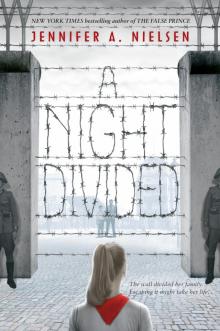 A Night Divided
A Night Divided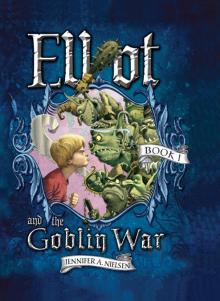 Elliot and the Goblin War
Elliot and the Goblin War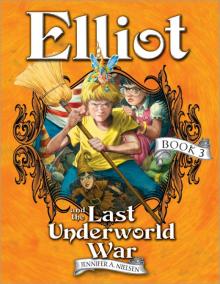 Elliot and the Last Underworld War
Elliot and the Last Underworld War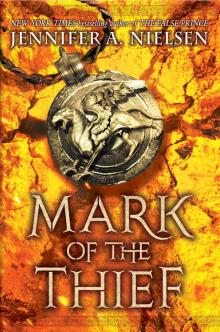 Mark of the Thief
Mark of the Thief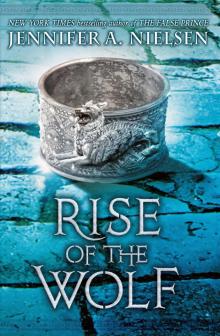 Rise of the Wolf
Rise of the Wolf Elliot and the Pixie Plot
Elliot and the Pixie Plot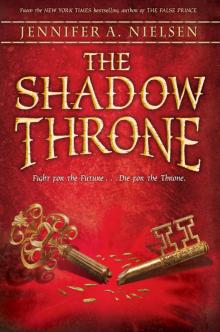 The Shadow Throne
The Shadow Throne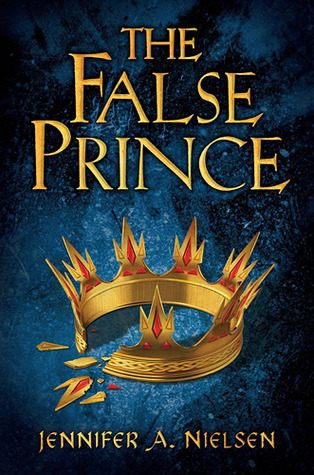 The False Prince
The False Prince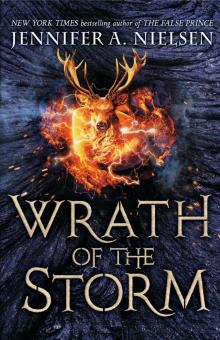 Wrath of the Storm
Wrath of the Storm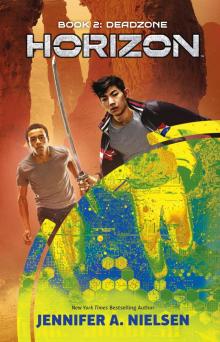 Deadzone
Deadzone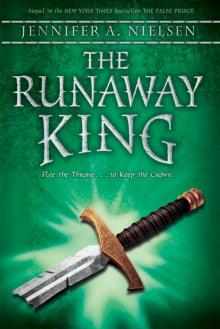 The Runaway King
The Runaway King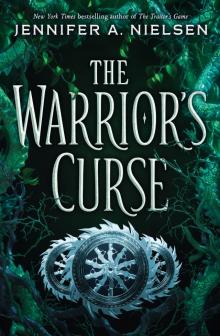 The Warrior's Curse
The Warrior's Curse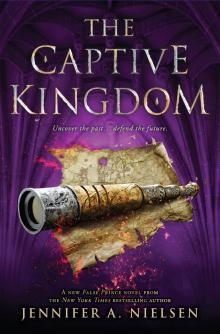 The Captive Kingdom
The Captive Kingdom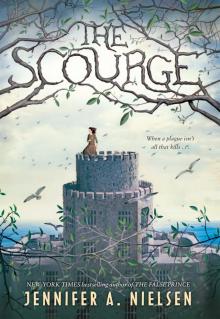 The Scourge
The Scourge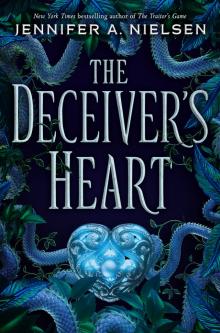 The Deceiver's Heart
The Deceiver's Heart Resistance
Resistance